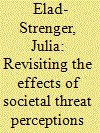| Srl | Item |
| 1 |
ID:
189005


|
|
|
|
|
| Summary/Abstract |
This article presents findings of an original survey experiment on public attitudes toward nuclear use conducted on a representative sample of Russian citizens. We randomly assigned our participants to experimental treatments with vignettes describing a military conflict between Russia and NATO in the Baltics, where Moscow considered a limited nuclear “escalate-to-deescalate” strike to avert defeat. Our findings show that Russians are significantly more averse to nuclear strikes than to the corresponding use of conventional missiles. The participants disapproved similarly of a demonstrative nuclear explosion in an unpopulated area and of nuclear strikes in a more escalated scenario. We also found associations between the moral values of individuals and strike support corresponding to earlier studies in the United States. Finally, our participants reported similar concerns about both nuclear and conventional strikes, with the worry about civilian casualties and the suffering of victims at the top of the list across experimental treatments.
|
|
|
|
|
|
|
|
|
|
|
|
|
|
|
|
| 2 |
ID:
149422


|
|
|
|
|
| Summary/Abstract |
Political ideology is often characterized along a liberal–conservative continuum in the United States and the left–right continuum in Europe. However, no study has examined what this characterization means to young Turkish voters or whether it predicts their approach to morality. In Study 1, we investigated in two separate samples the relation between young Turkish participants’ responses to the one-item left-to-right political orientation question and their self-reported political ideologies (conservative, socialist, etc.). In Study 2, we investigated the relation of moral dimensions as defined by Moral Foundations Theory to political party affiliation and political ideology. Results revealed that CHP, MHP, and AKP voters display a typical right-wing profile distinct from HDP voters. Findings regarding political ideology measures were consistent with party affiliations. Taken together, the findings reveal the distinctive nature of young Turkish people’s political orientations while supporting the predictive power of the one-item political orientation question.
|
|
|
|
|
|
|
|
|
|
|
|
|
|
|
|
| 3 |
ID:
161598


|
|
|
|
|
| Summary/Abstract |
Past research has produced convincing evidence for the association between perceived societal threat and political conservatism. Based on the view of political worldviews and threat perceptions as multifaceted constructs, the present study suggests that certain types of perceived threat are actually associated with the endorsement of more politically liberal positions. Employing a three-wave naturalistic design, we examined the unique longitudinal effects of perceived threats from real-life political events that challenge either liberal or conservative values, on conflict-related attitudes, using a nationally representative sample of Jewish-Israelis (N = 437). Consistent with our hypotheses, perceived threat from events that challenge conservative values was associated with increased militaristic attitudes and decreased willingness to compromise for peace over time, whereas perceived threat from events that challenge liberal values was related to decreased militaristic attitudes and increased willingness to compromise for peace over time. Theoretical and practical implications of these longitudinal effects are discussed.
|
|
|
|
|
|
|
|
|
|
|
|
|
|
|
|